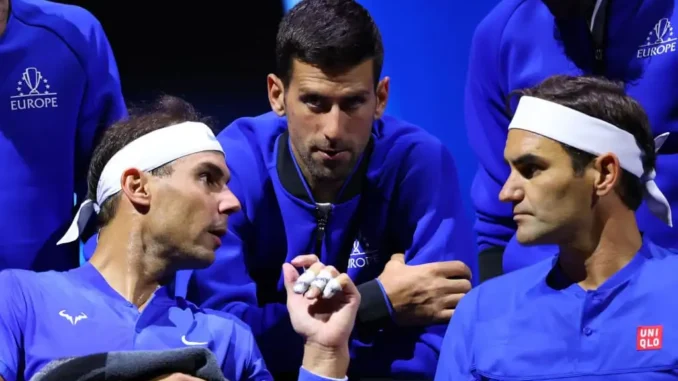
Novak Djokovic, the Serbian tennis titan with a record 24 Grand Slam titles, has opened up about the emotional challenges he faced as the “third wheel” in the iconic rivalry between Roger Federer and Rafael Nadal. In a candid interview on the *Failures of Champions* podcast with former Croatian footballer Slaven Bilic, the 38-year-old revealed the pain of feeling like an “unwanted child” among fans, despite surpassing his rivals in nearly every statistical category. “I acted and still felt like an unwanted child,” Djokovic confessed. “I asked myself why that was. It hurt me.” His raw honesty sheds light on the personal toll of disrupting the beloved Federer-Nadal narrative, offering a glimpse into the psyche of a champion who redefined tennis’ golden era.
When Djokovic burst onto the scene, Federer and Nadal had already captivated the tennis world. By 2008, when Djokovic won his first Grand Slam at the Australian Open, Federer held 12 majors and Nadal three, their rivalry a global spectacle. Fans, divided into “Fedal” camps, cherished the Swiss maestro’s elegance and the Spaniard’s relentless grit. Djokovic, a year younger than Nadal and five years younger than Federer, emerged as the audacious outsider, boldly declaring, “I’m going to be No. 1.” His ambition was met with resistance. “I was never as loved as Federer and Nadal because I wasn’t supposed to be there,” he said. “I was the little guy, the third guy who came along and said, ‘I’m going to be number one.’ Many people didn’t like that.” This perceived rejection stung, prompting Djokovic to question his place in the sport he would come to dominate.
Determined to win over crowds, Djokovic tried to adapt. Around the mid-2010s, he embarked on a charm offensive, symbolized by his post-match gesture of blowing kisses to each corner of the stadium. “I thought the fans would accept me if I acted differently,” he admitted. “But that wasn’t the case either.” Despite his efforts, the adoration for Federer and Nadal remained unmatched, a reality Djokovic attributed to cultural factors. “The two of them had already developed a rivalry before I came along because Nadal broke through a few years before me. They come from Switzerland, from Spain, so Western powers,” he explained, noting how his Serbian roots and assertive confidence may have clashed with fans’ expectations.
Yet, Djokovic’s resolve never wavered. By 2011, he had ascended to World No. 1, a position he held for a record 428 weeks across 13 years. His 24 majors, 40 ATP Masters 1000 titles, and seven ATP Finals victories eclipsed Federer’s 20 and Nadal’s 22 Grand Slams, cementing his claim as the statistical GOAT. His head-to-head edges—27-23 against Federer and 31-29 against Nadal—further underscore his dominance. Still, the emotional weight of feeling unaccepted lingered. “I am a man with many flaws, of course,” he reflected. “Nevertheless, I have always tried to live with heart and good intentions and, ultimately, to be myself.”
Despite the frosty fan reception, Djokovic harbors no bitterness toward his rivals. “Just because someone is my biggest rival doesn’t mean I wish them harm, hate them, or want to do anything else on the court to defeat them,” he said. “We fought for the win, and the better player won.” He expressed deep respect for both, adding, “I’ve always respected both Federer and Nadal; I’ve never said a single bad word about them and never will. I looked up to them and still do.” Notably, he admitted a closer bond with Nadal, saying, “I’ve always gotten along better with Nadal,” a connection evident during their emotional reunion at Nadal’s 2025 French Open farewell ceremony.
Djokovic’s journey mirrors his relentless pursuit of growth. He credits the rivalries for shaping him, saying, “The rivalry with those two had the most influence on my development, especially in the second part of my career.” As Federer and Nadal have retired, Djokovic soldiers on, chasing a 25th Grand Slam at Wimbledon 2025 after a semifinal loss to Jannik Sinner at Roland Garros. His resilience, forged through years of battling both opponents and perceptions, remains his hallmark. For Djokovic, the pain of feeling unwanted fueled a legacy that redefined tennis, proving that even an “unwanted child” can become the sport’s undisputed king.
Leave a Reply